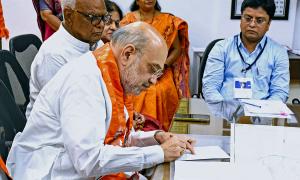The apex body for farmers' organisations has stated in a representation to the government that even big farmers were worse off than the lowest-paid government employees. It has charged the government with discrimination against farmers vis-à-vis workers from other sectors.
While the government has taken no more than four months to implement the Sixth Pay Commission report, even going beyond the recommendations, there has been little action on the report of the National Commission on Farmers headed by Dr MS Swaminathan even after 22 months. This commission had suggested measures to ensure that the net take-home income of the farmers was comparable with that of civil servants.
This has been stated in the representation submitted by the Consortium of Indian Farmers Associations to Prime Minister Manmohan Singh. It has quoted from the report of the Arjun Sengupta Commission on unorganised sector workers and some studies by the Planning Commission and other organisations to support its contentions.
The Arjun Sengupta report had said that the average monthly income per household from cultivation was Rs 1,578 a month for small farmers and Rs 8,321 for big farmers in 2003. In comparison, the lowest-paid government employee got the pay and perks exceeding Rs 10,000 a month.
The Planning Commission studies have shown that the income ratio for agricultural workers and non-agricultural workers has deteriorated steadily from 1:1.8 in 1950-51 to 1:2.8 in the period 1978-79 to 1983-84 and further to a whopping 1:5.2 in 1998-99 to 2003-04.
The CIFA memorandum, signed by its general secretary Chengal Reddy, has also referred to a study conducted by the Hyderabad-based NG Ranga Agricultural University to point out that a farmer needed to cultivate 15 to 20 acres (6 to 8 hectares) of dry land to earn an income of Rs 4,000 (equivalent to that of a peon) in Telengana and Rayalseema in Andhra Pradesh.
In the coastal areas of the state, the farmers needed to cultivate paddy on at least 10 acres (4 hectares) to earn the same level of income. The average farm holding in India is less than 2 hectares.
For the plight of the rural people, Reddy has blamed the apathy of the government towards the farmers, as reflected in the fixation of low minimum support prices for crops. He has cited the report of the Parliamentary Standing Committee on Agriculture (report No 41 dated 22 July, 2008) to substantiate this plea.
The report had stated that the prices of agricultural produce received by the farmers were lower than the market prices and were often less than the cost of cultivation. The committee had favoured fixation of remunerative prices for the farm produce.
The Swaminathan Commission had recommended that the MSP should be at least 50 per cent more than the weighted average cost of production. While some relatively less consequential and peripheral suggestions of this commission have been included by the government in its national policy on agriculture, the key recommendations have so far been ignored.
The CIFA has also pointed out that the marginal farmers usually turn landless labourers and the small farmers become marginal farmers during their own lifetime. This amounted virtually to their demotion. The government employees, on the other hand, have been assured at least three promotions during their service.
"Wide, unacceptable disparities in farm and non-farm incomes have occurred mainly because the agriculture produce is underpriced for decades and the surplus amount is transferred to organised sector workers including the government employees, whose productivity does not increase even nominally with successive pay raises," the representation has maintained.









More from rediff